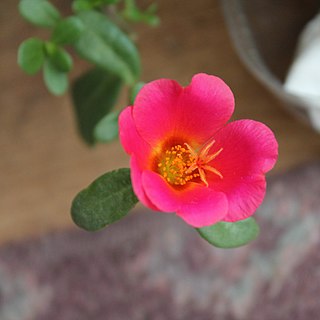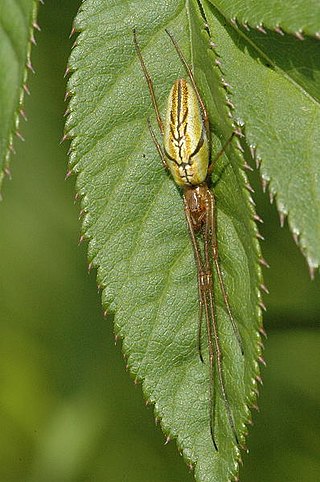
Portulaca is a genus of flowering plants in the family Portulacaceae, and is the type genus of the family. With over 100 species, it is found in the tropics and warm temperate regions. Portulacas are also known as the purslanes.

The Portulacaceae are a family of flowering plants, comprising 115 species in a single genus Portulaca. Formerly some 20 genera with about 500 species, were placed there, but it is now restricted to encompass only one genus, the other genera being placed elsewhere. The family has been recognised by most taxonomists, and is also known as the purslane family. It has a cosmopolitan distribution, with the highest diversity in semiarid regions of the Southern Hemisphere in Africa, Australia, and South America, but with a few species also extending north into Arctic regions. The family is very similar to the Caryophyllaceae, differing in the calyx, which has only two sepals.

Tetragnatha is a genus of long-jawed orb-weavers found all over the world. It was first described by Pierre André Latreille in 1804, and it contains hundreds of species. Most occur in the tropics and subtropics, and many can run over water. They are commonly called stretch spiders in reference to their elongated body form and their ability to hide on blades of grass or similar elongated substrates by stretching their front legs forward and the others behind them. The name Tetragnatha is derived from Greek, tetra- a numerical prefix referring to four and gnatha meaning "jaw". Evolution to cursorial behavior occurred long ago in a few different species, the most studied being those found on the Hawaiian islands. One of the biggest and most common species is T. extensa, which has a holarctic distribution. It can be found near lakes, river banks or swamps. Large numbers of individuals can often be found in reeds, tall grass, and around minor trees and shrubs.

Dicranomyia is a genus of crane fly in the family Limoniidae. Larvae are mostly aquatic or semi-aquatic, with an exception found in a single Hawaiian Islands species which has a leaf-mining larva.

Echinophoria is a genus of large sea snails, marine gastropod mollusks in the family Cassidae, the helmet snails and bonnet snails.

Phrynetini is a tribe of longhorn beetles of the subfamily Lamiinae. It was described by Thomson in 1864.

Phrynetopsis is a genus of longhorn beetles of the subfamily Lamiinae, containing the following species:

Phrynetopsis fuscicornis is a species of beetle in the family Cerambycidae. It was described by Chevrolat in 1856. It has a wide distribution in Africa. It contains the varietas Phrynetopsis fuscicornis var. mystica.
Phrynetopsis kolbei is a species of beetle in the family Cerambycidae. It was described by Charles Joseph Gahan in 1909. It is known from Uganda, and the Democratic Republic of the Congo.
Phrynetopsis loveni is a species of beetle in the family Cerambycidae. It was described by Per Olof Christopher Aurivillius in 1925. It was described by Tanzania, Kenya, and Uganda.
Phrynetopsis marshalli is a species of beetle in the family Cerambycidae. It was described by Stephan von Breuning in 1935. It is known from Sierra Leone and Ghana.

Phrynetopsis thomensis is a species of beetle in the family Cerambycidae. It was described by Karl Jordan in 1903. It is known from São Tomé and Príncipe.
Phrynetopsis variegata is a species of beetle in the family Cerambycidae. It was described by Reiche in 1849. It is known from Ethiopia.
Celleporaria is a genus of bryozoans belonging to the family Lepraliellidae.
Cnipsomorpha is a genus of Asian stick insects in the tribe Medaurini, erected by Hennemann, Conle, Zhang and Liu in 2008. Species have been recorded from: southern China and Vietnam.








